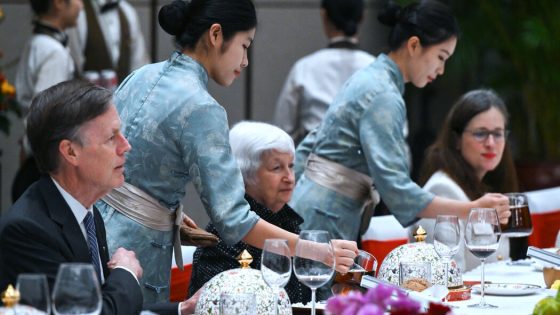After three hours of meetings on Friday, Treasury Secretary Janet L. Yellen and Vice Premier He Lifeng of China sat down for a working dinner at the White Swan Hotel in Guangzhou, China. They planned to follow that with a scenic boat cruise along the city’s Pearl River.
The evening activity was intended to give the pair, the top economic officials from the United States and China, an opportunity to go beyond talking points and build trust.
But the first of four days of discussions about their economies was about more than pleasantries. Following months of work to reopen communication with China, Ms. Yellen lodged a direct complaint: Cheap Chinese exports of green energy technology are threatening the electric vehicle and solar sectors that the United States has been trying to develop, and the Biden administration is prepared to protect them.
The message represented a challenging test of economic diplomacy for Ms. Yellen. She wants China to dial back its industrial policy just as the United States is ramping up its own with trillions of dollars of subsidies for domestic clean energy industries. The new push against China’s exports threatens to inflame trade tensions between the world’s largest economies just as they have been working to stabilize relations.
Ahead of her meeting with Mr. He, Ms. Yellen previewed her arguments before a group of American business executives operating in China, explaining her view that China cannot jump-start its growth with an export boom and advising that it should focus on supporting greater consumption within its own borders. She also warned that a surge of Chinese green technology products being sold below the cost of production will warp global supply chains by depressing prices and forcing firms worldwide to shutter.
“Overcapacity isn’t a new problem, but it has intensified, and we’re seeing emerging risks in new sectors,” Ms. Yellen said on Friday.
She emphasized that the United States was not adopting an “anti-China” policy and said that, as an economist, it was her view that China could benefit if it stopped giving subsidies to firms that would fail without government support.
Despite the criticism of China’s economic strategy, Ms. Yellen received a warm welcome from her Chinese counterparts on her second trip there as treasury secretary. Ms. Yellen is popular in China because of her record as an academic economist. Last summer she caused a stir on social media when she ate a dish made with psychedelic mushrooms at a restaurant in Beijing. On Thursday, a state-run media outlet praised her proficiency with chopsticks while she dined at a local Cantonese restaurant.
But if Ms. Yellen’s message about overcapacity is followed by tariffs or other U.S. trade restrictions, relations could quickly sour.
During a separate meeting on Friday with the governor of Guangdong Province, Wang Weizhong, Ms. Yellen recalled that Guangzhou was historically a hub for Chinese trade and a place that was at the center of 1970s-era market-oriented reforms that opened China’s economy and supercharged its growth. Then she raised her concerns about China’s current path.
“Building a healthy economic relationship requires a level playing field for American workers and firms, as well as open and direct communication on areas where we disagree,” Ms. Yellen said. “This includes the issue of China’s industrial overcapacity, which the United States and other countries are concerned can cause global spillovers.”
Treasury officials say that they fear that elevated Chinese production targets are causing its firms to produce far more electric vehicles, batteries and solar panels than global markets can absorb, driving prices lower and disrupting production around the world. They fear that these spillovers will hurt businesses that are planning investments in the United States with tax credits and subsidies that were created through the Inflation Reduction Act of 2022, a law that is pumping more than $2 trillion into clean energy infrastructure.
As Ms. Yellen noted, the issue of Chinese overcapacity has been around for decades. A report last month published by the Rhodium Group, a research firm, recalled that a Chinese stimulus program initiated after the 2008 financial crisis focusing on infrastructure and property construction led to a global glut of steel and aluminum products after demand for real estate weakened.
Following the pandemic slowdown, China has focused on factory production to bolster its sputtering economy. Its exports, measured in dollars, rose 7 percent in January and February from the same period a year ago. Because of an emphasis on green technology, Chinese firms are producing far more silicon wafers and lithium-ion batteries than they can sell, according to Rhodium, as overall business inventories are hitting record highs.
While the CHIPS and Science Act that passed in the United States in 2022 provided $39 billion in manufacturing incentives for semiconductors, the city of Guangzhou alone established a $29 billion fund for semiconductor and renewable energy initiatives last year.
China has acknowledged in the past that overproduction can be harmful, however it is not clear that America’s concerns will spur a course correction at a time when the United States is pursuing its own subsidies.
Ahead of Ms. Yellen’s visit, China has accused the United States of protectionism. Last week, China filed a complaint with the World Trade Organization contending that the Biden administration’s electric vehicle subsidy policies are discriminatory. This week, the state-run China Daily newspaper called the United States the “biggest threat to economic globalization” because of opposition to a proposed merger between the Japanese company Nippon Steel and U.S. Steel.
“It’s a very tough sell when we’re doing much the same thing,” said Scott Lincicome, a trade expert at the free-market oriented Cato Institute. “Regardless of whether you think the United States should be pursuing these subsidies, the fact is that the rhetorical and political effect is inevitably going to be undermined when your argument is, do as I say, not as I do.”
Mr. Lincicome also suggested that the Biden administration is working against its own climate goals by discouraging China from producing the renewable energy products that the United States wants the world to be utilizing.
Mary Gallagher, a political science professor at the University of Michigan, argues that China’s embrace of excess industrial capacity is a feature of its central government’s economic plan rather than a “bug” because it has allowed the country to lead the world in green energy technology innovation while local governments grapple with the fiscal fallout. Because of China’s dominance of these industries, and of electric vehicles in particular, she said that the United States now has higher priorities than upholding traditional free trade principles.
“With the whole system moving to electrification, dependency on a country like China for those products is dangerous,” Ms. Gallagher, a Chinese politics expert, said. “If the United States is not producing itself, it will lose out.”
Biden administration officials make a similar argument, pointing out that its green energy investments are different than what China is doing. They say American subsidies are meant to ensure that domestic supply chains are diversified and resilient, not to dominate global markets.
The United States is considering refashioning some of the tariffs that the Trump administration imposed on more than $300 billion of Chinese imports so that they target China’s green energy products. During a stop in Alaska on her flight to China, Ms. Yellen said that she would not rule out ways to protect the industries that the United States has been subsidizing. Treasury officials noted that Europe is already investigating China’s electric vehicle subsidies and that Mexico and Brazil are also pursuing anti-dumping measures in response to China’s export wave.
The heightened focus from the United States on Chinese exports coincides with the approaching U.S. presidential election in November and concerns that Beijing’s policies could threaten American jobs and union workers.
Scott Paul, president of the Alliance for American Manufacturing, said that the $20 billion U.S. trade deficit with China is too high and that China is increasingly routing its products through Mexico to dodge American duties and tariffs.
“It’s important for Beijing to receive the message that there’s no more business as usual from the United States,” Mr. Paul said.
As she greeted Mr. He on Friday afternoon, Ms. Yellen delivered her concerns about China’s export push while striking a diplomatic tone.
“A healthy economic relationship must provide a level playing field for firms and workers in both countries,” she said.
Mr. He, speaking through a translator, said that he hoped to make progress on critical economic issues, adding, “We also need to properly respond to key concerns from the other side.”
Source Agencies



